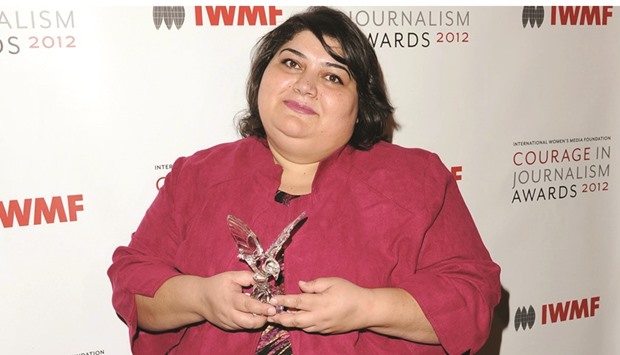Azerbaijan has released jailed prominent investigative journalist Khadija Ismayilova, who was convicted of corruption charges last year, triggering an international uproar.
Ismayilova, an award-winning journalist and anti-graft crusader, was sentenced in September 2015 for seven-and-a-half years for economic crimes, in a case denounced by her supporters and rights groups as politically motivated.
She walked out of prison beaming yesterday evening after a Supreme Court ruling earlier in the day, having spent more than 17 months in jail since her initial arrest in December 2014.
“I am full of energy and will continue my journalistic work,” Ismayilova told journalists in brief comments before she headed home, an AFP journalist reported.
“Azerbaijan’s Supreme Court threw out Ismayilova’s initial seven-and-a-half-year sentence and handed her a three-and-a-half-year suspended sentence,” her lawyer Fariz Namazly told AFP.
The reporter, who turns 40 tomorrow, probed the vast riches allegedly amassed by President Ilham Aliyev and his family.
Some of her reporting was recently confirmed by journalists working on the Panama Papers leaked materials.
Rights groups applauded the release, with Human Rights Watch’s Europe director Lotte Leich calling it “best news in a long time”.
United Nations culture agency, Unesco, which last month awarded Ismayilova with the prestigious World Press Freedom Prize, welcomed it as “a major step for freedom of expression, due process and the rule of law in Azerbaijan”.
German Foreign Minister Frank-Walter Steinmeier said he hoped this was a “sign of improvement in the situation of freedom of press and opinion in Azerbaijan”.
The Committee to Protect Journalists (CPJ) – which ranks Azerbaijan among 10 most censored countries in the world – called the decision to free Ismayilova a “cause for celebration”.
Considered Azerbaijan’s most prominent opposition journalist, Ismayilova served as bureau chief for the local service of the US-funded Radio Free Europe/Radio Liberty network between 2008 and 2010.
Authorities raided the RFE/RL’s offices in late December 2014, seizing papers and equipment and detaining staff, according to the company, which closed its sealed bureau last May.
“This is a great day for Khadija, and for all journalists and for free speech everywhere,” RFE/RL editor-in-chief Nenad Pejic was quoted by the broadcaster as saying. “We are overjoyed for Khadija and her family and can’t wait for her to get back to work.”
Ismayilova has been proclaimed a prisoner of conscience by Amnesty International and has seen celebrities step in to the campaign for her freedom.
British human rights lawyer Amal Clooney, who represents Ismayilova before the European Court of Human Rights, has said that the journalist’s case “involved a politically motivated prosecution to restrict her freedom of speech”.
Last year, rocker and political activist Bono spoke out in support of jailed Azerbaijani activists, including Ismayilova.
In a leaked diplomatic cable from 2009 published by WikiLeaks, Aliyev is said to have described Ismayilova as an “enemy of the government”, asking the US ambassador to Azerbaijan to intervene to have her sacked by Radio Liberty.
Dissent is kept under strict control in Azerbaijan and is often met with a tough government response.
Rights groups say the government of the oil-rich ex-Soviet republic has stepped up pressure on opponents since Aliyev’s election for a third term in 2013.
Aliyev – who came to power in 2003 following an election seen as flawed by foreign observers – strongly denies accusations of rights abuses, while his administration has dismissed criticism as a smear campaign.

This file photo taken in 2012 shows Ismayilova at the Courage in Journalism Awards hosted by the International Women’s Media Foundation, held at the Beverly Hills Hotel, California.
